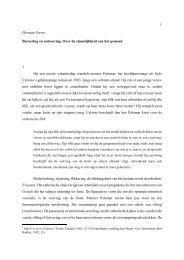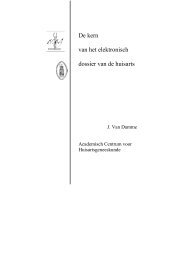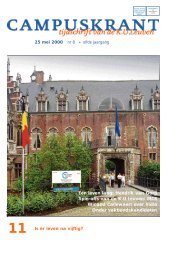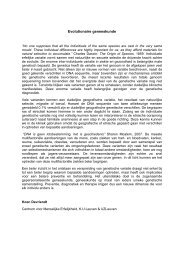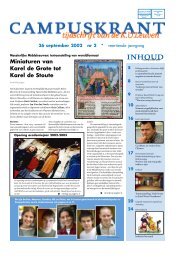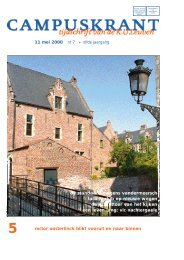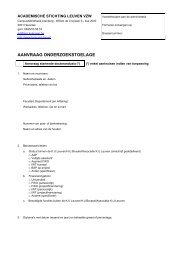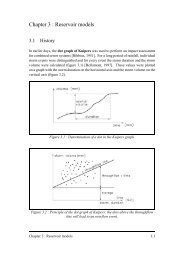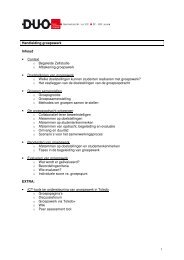EQUALITY GUIdE - KU Leuven
EQUALITY GUIdE - KU Leuven
EQUALITY GUIdE - KU Leuven
You also want an ePaper? Increase the reach of your titles
YUMPU automatically turns print PDFs into web optimized ePapers that Google loves.
82 Equality Guide<br />
nations, it was decided to use the factor ‘faculty’ instead of ‘discipline’. This option still<br />
enables the division of students into ‘typically’ male and female fields of study. Moreover,<br />
it facilitates the comparison with the real number of male and female students in<br />
each faculty.<br />
2.4.1.1. Studying at Ghent University<br />
The first theme deals with the experience of studying at Ghent University. The specific<br />
questions were based on a thorough reading of studies with reference to the study and<br />
career choices of boys and girls. Marlies Lacante divides young people’s motivation to<br />
choose a certain discipline or career into three groups, viz. personal motives, economic<br />
motives, and social/altruistic motives 89 . According to Lacante, the deciding factors in<br />
choosing a discipline are the personal beliefs and the urge to develop one’s personality,<br />
talents and abilities. Although these factors re-occur in Van Aerschot’s study, other<br />
motives are thought to play a more significant role, such as a clear interest in the subjects,<br />
talents, job security and a childhood dream 90 . Van Aerschot also analysed the<br />
motives behind the choices male and female students make. In her opinion, girls are<br />
on the look-out for disciplines or jobs with an emphasis on social aspects (e.g. direct<br />
contact with people, helping others), whereas boys are rather led by promotion prospects.<br />
Furthermore, boys take into account ! more than girls do ! their grammar<br />
school’s study results and the status of a certain discipline or career 91 .<br />
Hoornaert distinguishes between individual (internal) and social (external) factors 92 .<br />
The choices one makes are largely determined by the internal aspects one attributes to<br />
a discipline or career -such as the opportunities for self-fulfilment- as well as the accordance<br />
with one’s world view and principles. Additionally, certain external factors cannot<br />
be ignored, such as the expectations of friends and family, the status of a job, the<br />
careers of parents and the attention the job gets in grammar school. Hoornaert states<br />
that, for girls, the combination of internal and external factors often results in an inner<br />
struggle, because their interests in ‘softer’ disciplines do not correspond with the social<br />
pressure to succeed. Likewise, boys experience more pressure to choose ‘harder’ disciplines<br />
leading to job opportunities with a high status. Our survey also examines to what<br />
extent these individual and social factors really influence the study choices of the students<br />
at Ghent University.<br />
In Flanders, the academic staff is often employed in the university that they attended as<br />
students themselves. Therefore, the survey not only contains questions about the interest<br />
in an academic career, but also probes the students’ expectations and wishes of<br />
Ghent University as an employer. Obviously, the results were sex-segregated in order<br />
89<br />
90<br />
91<br />
92<br />
Deleu (2005), op. cit.: Lacante.<br />
Van Aerschot et al. (2003), op. cit., p. 65-66.<br />
Van Aerschot et al. (2003), op. cit., p. 68-70.<br />
Hoornaert (1999), op. cit., p. 18-20.



